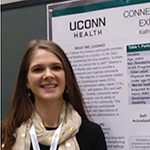 Graduate student Michelle Miller was selected by the Ford Foundation and TCC Group for a graduate fellowship through the American Evaluation Association GEDI Program. Through the fellowship program, Michelle will learn and build upon her evaluation programming skills. Congratulations, Michelle!
Graduate student Michelle Miller was selected by the Ford Foundation and TCC Group for a graduate fellowship through the American Evaluation Association GEDI Program. Through the fellowship program, Michelle will learn and build upon her evaluation programming skills. Congratulations, Michelle!
Students
Undergrad HDFS major Rupa Sharmin awarded Gilman Int’l Scholarship
Congratulations to undergraduate HDFS major Rupa Sharmin ’23, UConn Stamford student, who was awarded a Gilman International Scholarship, “congressionally funded through the Bureau of Education and Cultural Affairs at the State Department. The funding supports broadening the student population who participates in study abroad, encourages travel to diverse locations around the globe, intensive language study and internship experiences.” “With family from Bangladesh and a native of Stamford, she is an aspiring international pilot, seeking cross-cultural competency through the exchange opportunity. Sharmin is embarking on a career field in which fewer than 10 percent are women, and plans to use this position to explore the many cultures of the world, with attention to language study and cross cultural communication through immersion. Sharmin will apply to Yonsei University in South Korea for the spring 2022 semester and, upon her return, will reach out to SSS students to promote the Gilman scholarship and EGL program opportunities.” Learn more here: https://today.uconn.edu/2021/06/uconn-scholars-earn-gilman-and-cls-scholarships/
Samantha Lawrence receives UConn CLAS Scholarship
 Congratulations to graduate student Samantha Lawrence, recipient of the UConn CLAS Christine N. Witzel Scholarship, for “an academically promising…student…undertaking a research project related to women’s health”!
Congratulations to graduate student Samantha Lawrence, recipient of the UConn CLAS Christine N. Witzel Scholarship, for “an academically promising…student…undertaking a research project related to women’s health”!
Debra Tomasino working on study as gerontology researcher
 Congratulations to graduate student Debra Tomasino, who will be working on a multi-site study (Yale, Emory, and Northwestern) over the next year as a gerontology researcher on a project focused on improving Emergency Medicine for geriatric patients.
Congratulations to graduate student Debra Tomasino, who will be working on a multi-site study (Yale, Emory, and Northwestern) over the next year as a gerontology researcher on a project focused on improving Emergency Medicine for geriatric patients.
Kaleigh Ligus receives summer internship for the Gerontological Society of America
 This summer, Graduate Student Kaleigh Ligus will be the Greg O’Neil Student Policy Intern for the Gerontological Society of America. During this time, she will be immersed in aging-related policy development and participate in this process at the national level.
This summer, Graduate Student Kaleigh Ligus will be the Greg O’Neil Student Policy Intern for the Gerontological Society of America. During this time, she will be immersed in aging-related policy development and participate in this process at the national level.
HDFS undergraduate students selected to join CLAS Women’s Leadership Collective
Six HDFS undergraduate students were selected to join the 2021-2022 CLAS Women’s Leadership Collective: Makayla R Dawkins, Zarya B Hernandez Salto, Sierra R Jennings, Blessing Johnson, Bonnie Jurgensmier, and Maya S Reddy. The Collective provides undergraduate students with a unique leadership learning experience coupled with group mentorship from UConn alumnae. Congratulations to all of these students!
Sarah McKee and Marlene Schwartz featured in UConn Today


Graduate student Sarah McKee and Professor Marlene Schwartz were featured in UConn Today for their work on how color-coded nutrition information helps food pantry clients choose healthier options. Read the article here.
Breanna McFarlane and Maria Baratau featured in UConn Today
Two HDFS majors, Breanna McFarlane and Maria Baratau, featured in a story in UConn Today. Read the article here.
Alexandria Tomkunas selected to 2021 Southern Education Leadership Initiative cohort
 Congratulations to Graduate Student Alexandria Tomkunas who was selected to the 2021 Southern Education Leadership Initiative cohort. She will partake in an 8-week summer fellowship funded by the Southern Education Foundation and work for the organization “Voices for Georgia’s Children,” on a project analyzing the 181 Georgia school districts’ codes of conduct and discipline policies, in order to provide information to be reviewed in light of known policies and best practices for student outcomes and equity.
Congratulations to Graduate Student Alexandria Tomkunas who was selected to the 2021 Southern Education Leadership Initiative cohort. She will partake in an 8-week summer fellowship funded by the Southern Education Foundation and work for the organization “Voices for Georgia’s Children,” on a project analyzing the 181 Georgia school districts’ codes of conduct and discipline policies, in order to provide information to be reviewed in light of known policies and best practices for student outcomes and equity.
Abagail Horton receives NCFR honors student recognition
Congratulations to Graduate Student Abbey Horton, who received National Council on Family Relations (NCFR) honors student recognition for her master’s degree.